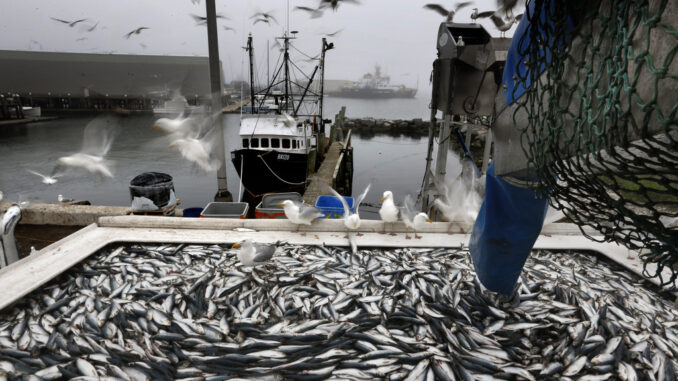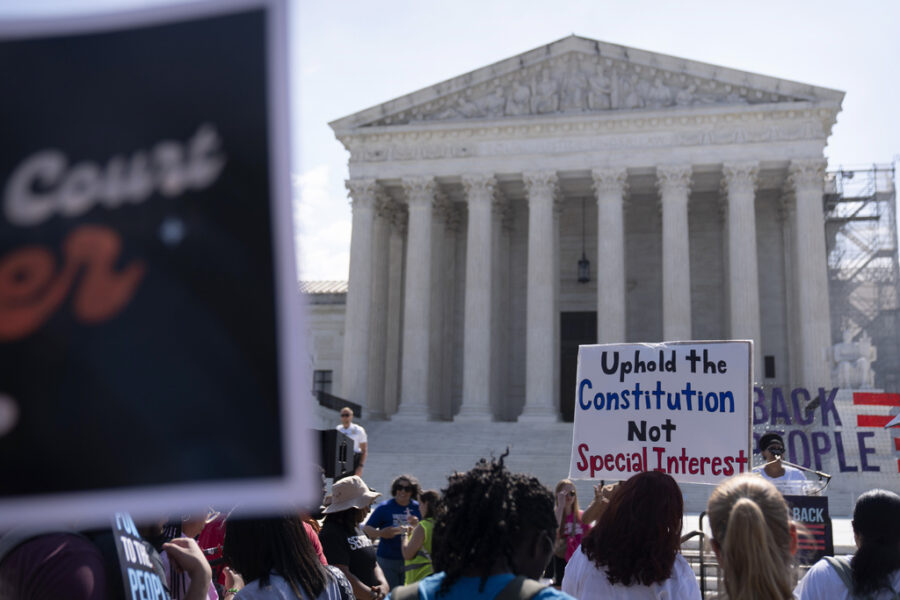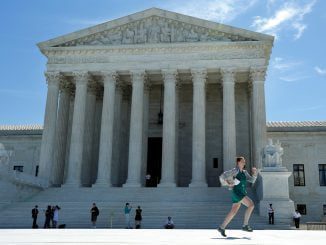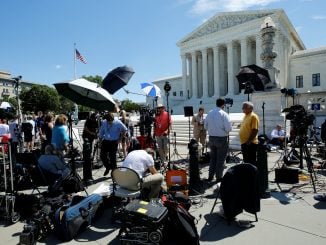
WASHINGTON, D.C. — The Supreme Court on Friday overruled a 40-year-old decision that required courts to defer to agency regulators in certain situations, delivering a victory to people and businesses seeking to challenge agency interpretations of federal laws.
In a 6-3 decision, the high court overturned the 1984 case of Chevron U.S.A., Inc. v. Natural Resources Defense Council, Inc., which established a principle of administrative law known as “Chevron deference.”

The Biden administration’s top Supreme Court lawyer had warned such a move would be an “unwarranted shock to the legal system.”
The heart of Chevron deference says courts should defer to a federal agency’s reasonable interpretations of a law when there are ambiguities. Opponents of the doctrine argued that it gave power that should be wielded by judges to experts who work for the government.
“Courts must exercise their independent judgment in deciding whether an agency has acted within its statutory authority,” Chief Justice John Roberts wrote for the court.
Roberts wrote that the decision does not call into question prior cases that relied on the Chevron decision.
But in dissent, Justice Elena Kagan wrote that the assurance rings hollow. “The majority is sanguine; I am not so much,” she wrote.
Kagan called the latest decision “yet another example of the Court’s resolve to roll back agency authority, despite congressional direction to the contrary.”
The court ruled in cases brought by Atlantic herring fishermen in New Jersey and Rhode Island who challenged a federal requirement that fishermen to pay for government-mandated observers on their boats to track their fish intake. Lower courts had used Chevron deference to uphold a 2020 National Marine Fisheries Service rule requiring the fisherman to pay for their regulators.
Business and free-market interests strongly backed the fishermen’s appeals.
The Supreme Court hadn’t invoked Chevron since 2016, but lower courts had continued to do so.
Forty years ago, the Supreme Court ruled 6-0, with three justices recused, that judges should play a limited, deferential role when evaluating the actions of agency experts in a case brought by environmental groups to challenge a Reagan administration effort to ease regulation of power plants and factories.
“Judges are not experts in the field, and are not part of either political branch of government,” Justice John Paul Stevens wrote in 1984, explaining why they should play a limited role.
But the current high court has been increasingly skeptical of the powers of federal agencies. Justices Samuel Alito, Neil Gorsuch, Brett Kavanaugh and Clarence Thomas all had questioned the Chevron decision.
They were in Friday’s majority, along with Justice Amy Coney Barrett.
Justices Ketanji Brown Jackson and Sonia Sotomayor joined Kagan in dissent.
Opponents of the Chevron doctrine argue that judges apply it too often to rubber-stamp decisions made by government bureaucrats. The court said Friday that judges must exercise their own authority and judgment to determine the law, adopting the opponents’ arguments.
Bill Bright, a Cape May, New Jersey-based fisherman who was part of the lawsuit, said the decision to overturn Chevron would help fishing businesses make a living. “Nothing is more important than protecting the livelihoods of our families and crews,” Bright said in a statement.
Defending the rulings that upheld the fees, President Joe Biden’s administration said that overturning the Chevron decision would produce a “convulsive shock” to the legal system.
Environmental, health advocacy groups, civil rights organizations, organized labor and Democrats on the national and state level had urged the court to leave the Chevron decision in place.
“The Supreme Court is pushing the nation into uncharted waters as it seizes power from our elected branches of government to advance its deregulatory agenda,” Sambhav Sankar, a lawyer with the environmental group Earthjustice, said after the ruling. “The conservative justices are aggressively reshaping the foundations of our government so that the President and Congress have less power to protect the public, and corporations have more power to challenge regulations in search of profits. This ruling threatens the legitimacy of hundreds of regulations that keep us safe, protect our homes and environment, and create a level playing field for businesses to compete on.”
Gun, e-cigarette, farm, timber and home-building groups were among the business groups supporting the fishermen. Groups that had intervened in recent high court cases limiting regulation of air and water pollution also backed the fishermen.
The fisherman sued to contest the 2020 regulation that would have authorized a fee that could have topped $700 a day, though no one ever had to pay it.
In separate lawsuits in New Jersey and Rhode Island, the fishermen argued that Congress never gave federal regulators authority to require the fisherman to pay for monitors. They lost in the lower courts, which relied on the Chevron decision to sustain the regulation. At the heart of the lower court’s ruling was whether the 1976 Magnuson-Stevens Fishery Conservation and Management Act allowed the federal fisheries agency to impose fees on herring fishermen. The federal law contained language allowing the federal government to impose observer fees on three groups: foreign vessels, vessels operating in limited access programs and vessels under the jurisdiction of the North Pacific Council.
A divided Court of Appeals for the D.C. Circuit had determined “there remained ‘some question’ as to Congress’s intent,” which triggered Chevron’s requirement that the court defer to the agency’s “reasonable” construction of the law. In today’s opinion, the majority opinion highlighted D.C. Circuit Judge Justin R. Walker’s dissent in an earlier decision upholding the federal agency’s rule. According to the the opinion, Walker’s dissent concluded “that Congress’s silence on industry-funded observers for the Atlantic herring fishery — coupled with the express provision for such observers in other fisheries and on foreign vessels — unambiguously indicated that NMFS lacked the authority to ‘require [Atlantic herring] fishermen to pay the wages of at-sea monitors.'”
The justices heard two cases on the same issue because Jackson was recused from the New Jersey case. She took part in it at an earlier stage when she was an appeals court judge. The full court participated in the case from Rhode Island.
The case was Loper Bright Enterprises v. Raimondo, Docket. No. 22-451.



